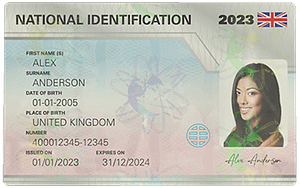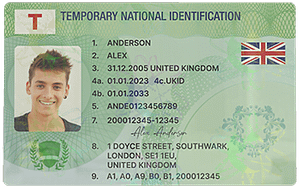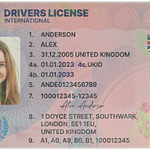Introduction
The problem of fake ID cards has reached a global scale, presenting serious threats to various aspects of society, including security, identity – verification systems, and economic stability. Combating fake ID cards requires international cooperation due to the cross – border nature of the problem. However, such cooperation is fraught with numerous challenges that need to be carefully addressed.
Legal and Regulatory Disparities
One of the most significant challenges in international cooperation against fake ID cards is the vast differences in legal and regulatory frameworks among countries. Each nation has its own set of laws regarding the production, use, and punishment for counterfeiting identity documents. For example, some countries may have very strict penalties for manufacturing fake ID cards, while others may have relatively lenient ones. This disparity makes it difficult to coordinate efforts. If a suspect is operating in a country with lax laws and then flees to a country with more stringent regulations, the extradition process can be complex and time – consuming. Moreover, the definition of what constitutes a fake ID card may also vary. In some countries, any altered or forged identification document is considered a serious offense, while in others, only certain types of official government – issued IDs may be covered by anti – counterfeiting laws.

Another aspect related to legal differences is the lack of a unified international standard for identity documents. Different countries use different security features, materials, and design elements for their ID cards. This makes it difficult to create a global database or a single set of detection methods for fake ID cards. For instance, some countries may rely heavily on holographic images, while others may use embedded microchips. A counterfeiter can take advantage of these differences by targeting countries with less advanced security features in their ID cards.
Jurisdictional Issues
Jurisdiction is a major hurdle in international cooperation against fake ID card operations. Determining which country has the right to prosecute a suspect involved in cross – border fake ID activities can be a complex matter. In cases where a fake ID production network has operations in multiple countries, it is not always clear whether the country where the raw materials are sourced, the country where the cards are manufactured, or the country where they are distributed should take the lead in the investigation and prosecution. For example, if a group is sourcing plastic materials from one country, manufacturing fake ID cards in another, and then distributing them in a third country, all three countries may have an interest in the case, but there may be disputes over who has primary jurisdiction.

Extradition procedures also play a crucial role in jurisdictional matters. Some countries may have complex or time – consuming extradition processes, and there may be political or diplomatic factors that influence whether a country is willing to extradite a suspect. Additionally, there may be differences in the legal requirements for extradition, such as the need for a formal request, the presence of a bilateral or multilateral extradition treaty, and the nature of the charges against the suspect. These factors can slow down or even prevent the effective prosecution of fake ID card criminals.
Communication and Information – Sharing Barriers
Effective communication and information – sharing are essential for international cooperation in combating fake ID cards. However, there are several barriers in this regard. Language differences are a significant obstacle. Law enforcement agencies and relevant authorities in different countries may speak different languages, making it difficult to exchange information accurately and efficiently. For example, if a European police force discovers a new type of fake ID card manufacturing technique, it may be challenging to communicate this information clearly to its counterparts in Asia or Africa without proper translation and interpretation services.
Another barrier is the lack of a unified platform for information – sharing. There is currently no single global system where law enforcement agencies can easily access and share data related to fake ID card cases. Each country may have its own databases and information – management systems, which are often not interoperable. This means that valuable intelligence, such as the modus operandi of fake ID card syndicates, the types of security features they are targeting, or the routes of distribution, may not be effectively shared across borders. Additionally, concerns about data privacy and security can also impede information – sharing. Some countries may be reluctant to share sensitive information about their identity – verification systems or ongoing investigations due to fears of it being misused or leaked.
Technological Gaps
Technological disparities among countries also pose challenges in the fight against fake ID cards. Developed countries often have more advanced technologies for detecting and preventing fake ID cards, such as biometric authentication systems, high – resolution scanners, and sophisticated forensic techniques. In contrast, developing countries may lack the financial resources, infrastructure, and technical expertise to implement such advanced technologies. This creates an imbalance in the global fight against fake ID cards, as counterfeiters may target countries with weaker technological defenses.
Moreover, the rapid pace of technological change means that counterfeiters are constantly evolving their techniques. New printing technologies, such as 3D printing, have made it easier to create high – quality fake ID cards. Law enforcement agencies and identity – verification systems need to keep up with these technological advancements. However, not all countries have the capacity to invest in research and development to stay ahead of counterfeiters. For example, a small developing nation may not be able to afford the latest anti – counterfeiting technologies or may lack the trained personnel to operate and maintain them effectively.
Common Problems and Solutions
- Problem: Inconsistent legal definitions
Solution: There is a need for international organizations, such as the United Nations or Interpol, to work towards developing a unified set of legal definitions for fake ID cards and related offenses. This could involve convening international conferences and workshops where legal experts from different countries can come together to draft model legislation. By having a more standardized legal framework, it would be easier to prosecute suspects across borders and ensure that all countries are on the same page when it comes to combating fake ID cards. - Problem: Lack of interoperable databases
Solution: The development of a global, secure, and interoperable database for fake ID card information should be a priority. This database could be maintained by an international body, such as Europol or Interpol. Participating countries would contribute data on fake ID card cases, including details about suspects, modus operandi, and security features of counterfeit cards. To address data privacy concerns, strict access controls and encryption techniques should be implemented, and countries should be assured that their data will be used only for the purpose of combating fake ID cards. - Problem: Language – related communication barriers
Solution: International organizations should invest in language – translation and interpretation services for law enforcement agencies. This could involve creating a pool of multilingual experts who can be quickly deployed to assist in cross – border communication. Additionally, the development of language – specific training programs for law enforcement officers could help improve their communication skills in dealing with international counterparts. For example, officers could be trained in basic legal and technical terms in multiple languages commonly used in the field of identity – verification and counterfeiting. - Problem: Technological disparities
Solution: Developed countries should provide technical assistance and capacity – building support to developing countries. This could include sharing advanced anti – counterfeiting technologies, providing training to local law enforcement and identity – verification personnel, and helping to build the necessary infrastructure. International development agencies could also play a role in funding projects related to improving identity – verification and anti – counterfeiting capabilities in developing countries. For example, they could provide grants for the purchase of modern ID – card detection equipment or the establishment of forensic laboratories. - Problem: Complex extradition procedures
Solution: Countries should work towards simplifying and streamlining extradition procedures. This could involve negotiating more bilateral and multilateral extradition treaties that are more straightforward and less prone to political interference. International legal frameworks could also be established to set clear guidelines for extradition in cases related to fake ID card crimes. Additionally, the development of alternative dispute – resolution mechanisms for jurisdictional disputes could help avoid lengthy legal battles and ensure that suspects are brought to justice more quickly.


